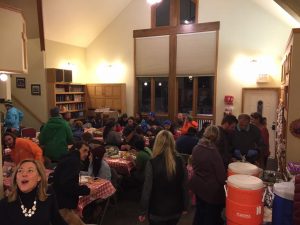
The Purpose of this Journey
Suzanne Elizabeth Anderson
I explode off the starting blocks. My arms slice through the water, my legs create a rooster’s tail of frothy water behind me as I race for the other end of the pool. My turns and finishes are my strength, so I count on them to help me win this freestyle sprint.
Swimming is a sport where you compete against yourself as much as you compete against the person in lane next to you. Because each swimmer has strengths and weakness that are unique to them, our coaches told us to ‘swim your own race’. If you watched your opponent and tried to emulate her pace, you’d destroy your own. If she took the race out early and struggled to hold on at the end, while you were a strong finisher, you would have exhausted your reserves trying to keep up with her.
Yes, swimming is a lot like life.
When we go to college, we are advised to choose a major that is marketable, that will lead to many job offers and a steady income. This is excellent advice. And if our talents and interests align with those required to excel in those majors, we will be well on our way.
However, if we have neither aptitude nor interest in a popular career path, we might find ourselves gainfully employed in a job we loathe.
Ironically, even if we discover our career of choice early, two or three decades down the road it might suddenly occur to us that something has changed and we are no longer happy with this job, or this place.
The measure of one’s success, of a life well lived, should in my estimation change as we mature and begin to see the wider horizon of our lives drawing near. What seemed desperately important in my 20’s, 30’s, and 40’s, changed with each decade and now in my 50’s seems frivolous.
“…one way or another the journey through time […] is a journey in search. Each must say for himself what he searches for, and there will be as many answers as there are searchers, but perhaps there are certain general answers that will do for us. We search for a self to be.” (Frederick Buechner, Listening to Your Life)
I believe the key is that our search for self never ends. That woman I was twenty years ago is of course not who I am today. But not only because of the aging process but because I have learned both from my successes, but more importantly, I have allowed my failures to be guideposts and perhaps change my path altogether.
It is only natural then, that the relationship we have with God today is different than the one we had when we were children singing Sunday school hymns, twenty-somethings with arms raised in a contemporary service, or ninety-years old and confronting what it means to walk with God in these final decades of our life.
The difference I’m describing isn’t one based on our age or knowledge. Instead, I want us to view our relationship with God the way we would consider a life-long relationship with a dear friend, a parent, a child, a husband, or wife. In each of these cases, I hope that there is at least one of these relationships which has grown stronger over the years, weathered storms, mended breaks, and as a result refined into a burnished golden love that is more meaningful than any other.
“We search for other selves to love. We search for work to do. And since even when to one degree or another we find these things, we find also that there is still something crucial missing which we have not found, we search for that unfound thing too, even though we do not know its name or where it is to be found or even if it is to be found at all.” (Frederick Buechner, Listening to Your Life)
I would argue that the ‘unfound’ thing which Buechner writes about is that thing which we often call the search for meaning, and which I suspect is the soul’s search for God. That is the relationship I hope we each experience not only with a loved one here on Earth, but also which we experience with God.
I believe the pursuit of a relationship with God of this depth and beauty is as essential to our purpose in life as anything, it is the best thing. As we embrace what it means to be loved unconditionally by God, we become brave enough to share our love with others. When we are honest enough with ourselves to stand before God and admit our failings, we become more forgiving of others, because we have been forgiven.
I have come to believe the search for a meaningful relationship with God is like the journey we take in the other areas of our life. We begin by looking around at how others are doing it, and are eager to follow a prescribed path. But as we have seen in our work lives, those who are most successful often had to forge their own way and encounter many setbacks. It was because they persevered that they reached the pinnacle.
A relationship with God can be the same. We begin on a path that emulates our parents or our community. If, however, we are to find true intimacy with God, eventually we must find a relationship with God that ours alone. Yes, of course, our churches guide and help us to grow. But in between services, we must speak with God one on one, seek his face, his voice, and find our own.
“Keep my commands in your heart, for they will prolong your life many years and bring you peace and prosperity” (Proverbs 3:1b-2 NIV).
Suzanne Elizabeth Anderson is the author of “A Map of Heaven.” She lives in Breckenridge. Join her at www.Facebook.com/suzanneelizabeths or www.suzanneelizabeths.co

